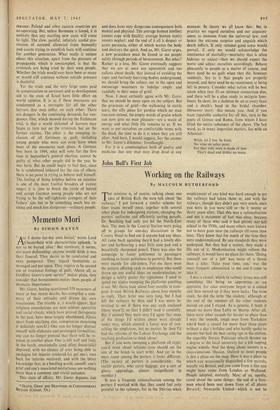Memento Mori
By SIMON•RAVEN
ALL I desire for. my own burial,' wrote Lord Chesterfield with characteristic aplomb, 'is not to be buried alive.' But survivors, it seems, are more defnanding; anyone would think it was their funeraL They desire to be comforted and even pampered. They regard themselvbs as wronged and put upon. They require to be coaxed out of irrational feelings of guilt. Above all, as Geoffrey Gorer's new survey* makes plain, they consider that bereavement makes them people of dramatic importance.
Mr. Gorer, having questioned 359 mourners of more or less recent deaths, has compiled a sum- mary of their attitudes and drawn his own conclusions. The trouble is, it would appear, that religious consolations are now seldom operative and social rituals, which have proved therapeutic in the past, have been largely abandoned. (Quite apart from anything else, conspicuous mourning is definitely non-U.) One can no longer distract oneself with elaborate and prolonged formalities; one can no longer pretend that there will be re- union in another place. One is left well and truly in the lurch, emotionally (and often financially) deprived, with no chance of ever being able to apologise for injuries rendered (or get one's own back for injuries received), and with the bitter knowledge that, in a bustling world, oneself, one's grief and one's associated misfortunes are nothing more than a common and trivial nuisance.
This state of affairs, Mr. Gorer deposes, can
• DEATH, GRIEF AND MOURNING IN CONTEMPORARY BRITAIN. (CTCSSCt, 35s.)
and does have very dangerous consequences both mental and physical. The average human intellect cannot cope with finality; average human vanity resents neglect; and the end of it all is despair or acute paranoia, either of which wastes the body and destroys the spirit. And so, Mr. Gorer urges, a new procedure must be found to see people safely through periods of bereavement. But what'd Rather at a loss, Mr. Gorer eventually suggests that we are at once too squeamish and too callous about death; that instead of avoiding the topic and furtively hurrying bodies underground, we should bring the subject out in the open and encourage mourners to indulge amply and candidly in their sense of grief.
Now, I most certainly agree with Mr. Gorer that we should be more open on the subject. But the processes of grief—the wallowing in sterile tears, the silly pleas for pardon which no man can now extend, the empty words of praise which can now give no man pleasure—are a waste of energy and what little life remains to us. If we want to put ourselves on comfortable terms with the dead, the time to do it is when they are still alive. And here, I would suggest, lies the answer to Mr. Gorer's dilemma: forethought.
For it is a commonplace both of poetry and medicine that any man may drop dead at any
moment. In theory we all know this: but in practice we regard ourselves and our acquaint- ances as immune from the universal law, and hence the extreme surprise and anguish which death inflicts. If only rational goOd sense would prevail, if only we would acknowledge the imminence of mortality—mortality that is often hideous or unjust—then we should expect the worst and adjust ourselves accordingly. Behave pleasantly to people as a matter of course, and there need be no guilt when they die, however suddenly. See to it that people are properly insured, and there need be no resentment at being left in penury. Consider what action will be best taken when (not if) an intimate connection dies, and there will be a plan ready to mitigate lone- liness. In short, let a skeleton be set at every feast and a death's head in the bridal chamber. Memento mod: this means you. And if you want reputable authority for all this, turn to the poets of Greece and Rome, from whom I have lifted the entire substance of the above. The last word, as in many important matters, lies with an Athenian:
While yet I live, be kind; No wine on ashes pour; For thus only mire is made of him That's dead and drinks no more.


































 Previous page
Previous page